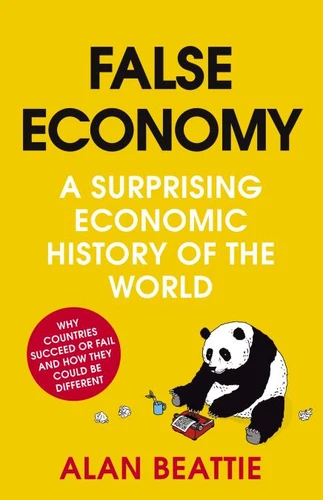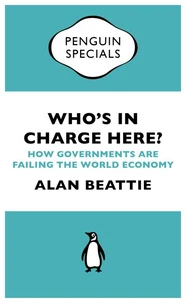False Economy : A Surprising Economic History of the World
Par :Formats :
Disponible dans votre compte client Decitre ou Furet du Nord dès validation de votre commande. Le format ePub protégé est :
- Compatible avec une lecture sur My Vivlio (smartphone, tablette, ordinateur)
- Compatible avec une lecture sur liseuses Vivlio
- Pour les liseuses autres que Vivlio, vous devez utiliser le logiciel Adobe Digital Edition. Non compatible avec la lecture sur les liseuses Kindle, Remarkable et Sony
- Non compatible avec un achat hors France métropolitaine
 , qui est-ce ?
, qui est-ce ?Notre partenaire de plateforme de lecture numérique où vous retrouverez l'ensemble de vos ebooks gratuitement
Pour en savoir plus sur nos ebooks, consultez notre aide en ligne ici
- Nombre de pages336
- FormatePub
- ISBN978-0-14-192993-4
- EAN9780141929934
- Date de parution04/06/2009
- Protection num.Adobe DRM
- Infos supplémentairesepub
- ÉditeurPENGUIN
Résumé
*NEW YORK TIMES BESTSELLER*Why do some countries succeed while others fail? What causes boom or bust? The World Trade Editor of the FT explains how the world really works.'A thorough examination of economies from the age of empire to the age of the IMF' The Washington PostWhy do oil and diamonds lead to economic disaster more often than boom? Why doesn't Africa grow cocaine? Why might believing in God be good for your balance-sheet?Botswana and Sierra Leone are both blessed with abundant diamonds.
Why did Botswana became the world's fastest-growing economy while Sierra Leone suffered a decade of brutal civil war?For the past two hundred years Argentina had enjoyed a vista of economic opportunity almost identical to that of the USA but in 2001 Argentina's government bankrupted itself. Why did the USA succeed while Argentina stalled?Time and again, world leaders have failed to learn the lessons of economic history, and their mistakes continue to have surprising and catastrophic consequences.
The path to prosperity is rarely obvious and the sources of success are often unexpected. In False Economy, Alan Beattie uses extraordinary stories of economic triumph and disaster to explain how some countries went wrong while others went right, and why it's so difficult to change course once you're on the path to ruin.
Why did Botswana became the world's fastest-growing economy while Sierra Leone suffered a decade of brutal civil war?For the past two hundred years Argentina had enjoyed a vista of economic opportunity almost identical to that of the USA but in 2001 Argentina's government bankrupted itself. Why did the USA succeed while Argentina stalled?Time and again, world leaders have failed to learn the lessons of economic history, and their mistakes continue to have surprising and catastrophic consequences.
The path to prosperity is rarely obvious and the sources of success are often unexpected. In False Economy, Alan Beattie uses extraordinary stories of economic triumph and disaster to explain how some countries went wrong while others went right, and why it's so difficult to change course once you're on the path to ruin.
*NEW YORK TIMES BESTSELLER*Why do some countries succeed while others fail? What causes boom or bust? The World Trade Editor of the FT explains how the world really works.'A thorough examination of economies from the age of empire to the age of the IMF' The Washington PostWhy do oil and diamonds lead to economic disaster more often than boom? Why doesn't Africa grow cocaine? Why might believing in God be good for your balance-sheet?Botswana and Sierra Leone are both blessed with abundant diamonds.
Why did Botswana became the world's fastest-growing economy while Sierra Leone suffered a decade of brutal civil war?For the past two hundred years Argentina had enjoyed a vista of economic opportunity almost identical to that of the USA but in 2001 Argentina's government bankrupted itself. Why did the USA succeed while Argentina stalled?Time and again, world leaders have failed to learn the lessons of economic history, and their mistakes continue to have surprising and catastrophic consequences.
The path to prosperity is rarely obvious and the sources of success are often unexpected. In False Economy, Alan Beattie uses extraordinary stories of economic triumph and disaster to explain how some countries went wrong while others went right, and why it's so difficult to change course once you're on the path to ruin.
Why did Botswana became the world's fastest-growing economy while Sierra Leone suffered a decade of brutal civil war?For the past two hundred years Argentina had enjoyed a vista of economic opportunity almost identical to that of the USA but in 2001 Argentina's government bankrupted itself. Why did the USA succeed while Argentina stalled?Time and again, world leaders have failed to learn the lessons of economic history, and their mistakes continue to have surprising and catastrophic consequences.
The path to prosperity is rarely obvious and the sources of success are often unexpected. In False Economy, Alan Beattie uses extraordinary stories of economic triumph and disaster to explain how some countries went wrong while others went right, and why it's so difficult to change course once you're on the path to ruin.




